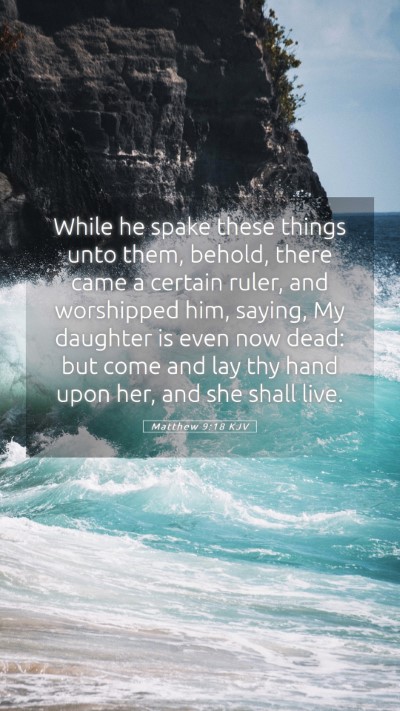Understanding Matthew 9:18: Insights from Public Domain Commentaries
Matthew 9:18 states:
"While he spake these things unto them, behold, there came a certain ruler, and worshipped him, saying, My daughter is even now dead: but come and lay thy hand upon her, and she shall live."
Introduction
The verse presents a profound moment involving a desperate father's plea to Jesus for his deceased daughter. To understand this passage better, we draw insights from various public domain commentaries, including those by Matthew Henry, Albert Barnes, and Adam Clarke. These commentaries help uncover the depths of meaning within this scripture, guiding us in our Bible study insights and Bible verse explanations.
Verse Breakdown
This verse plays a vital role in the narrative of Jesus's miracles and His interactions with the people of His time.
- The Ruler's Desperation: The ruler's challenge reflects the human condition; he approaches Jesus worshipfully, acknowledging His authority and power.
- The Nature of Faith: His belief that Jesus can restore life demonstrates an essential aspect of Bible verse understanding and Biblical exegesis.
- The Implicit Teachings: The act of laying hands is significant, representing Jesus' personal involvement in healing and restoration.
Commentary Insights
Matthew Henry's Commentary
Matthew Henry emphasizes several key aspects:
- Divine Authority: He notes that the ruler's approach showcases his recognition of Jesus's divine authority, a principle central in Scripture analysis.
- Urgency in Faith: Henry points out the urgency in the ruler’s plea, indicating a deep-seated faith in Jesus's miraculous capabilities.
Albert Barnes' Commentary
Albert Barnes provides a nuanced exploration:
- The Condition of the Daughter: He articulates that the daughter’s situation highlights the desperate need for healing, underscoring the grace that Jesus embodies.
- Significance of Worship: Barnes underscores the ruler's act of worship, indicating that true faith often manifests in worship.
Adam Clarke's Commentary
Adam Clarke adds depth with historical context:
- The Cultural Context: Clarke emphasizes the societal views on death and life, pointing to the ruler's extreme urgency driven by cultural beliefs.
- Miraculous Acts of Jesus: He discusses how this instance illustrates Jesus’s compassion and supernatural authority, which were pivotal in the New Testament miracles.
Application of the Verse
In applying this verse to our lives, several key takeaways emerge:
- Faith in Despair: When faced with dire situations, this verse serves as a reminder of the power of faith and the importance of seeking divine intervention.
- Worship as a Response: The ruler's worshipful approach encourages believers to come to Jesus in reverence and trust.
- Understanding Jesus' Nature: Recognizing Jesus as a source of hope and healing is essential for modern believers; His miracles signify His ongoing work in the world today.
Related Bible Cross References
- Mark 5:22-24 - A similar account of the ruler and the daughter illustrated in more detail.
- Matthew 9:25-26 - The subsequent miracle of Jesus raising the girl from the dead.
- Luke 8:41-56 - Another perspective on the same miracle, emphasizing the faith of the ruler and the response of Jesus.
Conclusion
Matthew 9:18 provides an excellent reflection of faith, urgency, and divine authority. Through studying this verse and its commentaries, we gain a deeper understanding of scriptural truths. This passage encourages readers to trust in Jesus amid life’s challenges. Whether you are involved in Bible study groups, online Bible study, or personal study, comprehending such verses can profoundly impact your spiritual journey.


